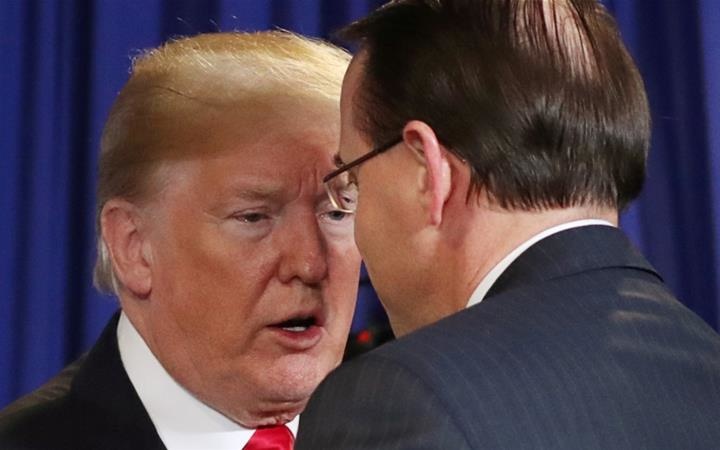Deputy Attorney General Rod Rosenstein and Donald Trump (File)
Former Justice Department and FBI officials have described how the Department secretly limited the investigation of the Trump campaign’s links with Russia and its interference in the 2016 Presidential election.
The 446-page Mueller Report, published in April 2019, documented the links and set out evidence for Trump’s obstruction or attempted obstruction of justice to block the inquiry. Special Counsel Robert Mueller secured three dozen indictments of Russian officials and Trump advisors, with several of the latter convicted.
But the Justice Department told Mueller that Trump could not be indicted, and Attorney General William Barr, appointed by Trump in January 2019, helped bury the report by misrepresenting its findings.
A 996-page bipartisan report from the Senate Intelligence Committee last week confirmed the Trump-Russia cooperation as a “disruption of democracy” and a “grave counterintelligence threat”. However, it received little attention amid Coronavirus, Black Lives Matter protests, and the party conventions.
See TrumpWatch, Day 1,141: Judge — Barr Distorted and Misled Over Mueller Report on Trump-Russia
Mueller Report Video: Collusion, Obstruction, and Accountability
The former officials say the Justice Department narrowed the investigation in 2017, even though FBI counterintelligence experts thought the Trump-Russia links were a national security threat.
They pointed at Deputy Attorney general Rod Rosenstein curbing the investigation without telling the FBI. He believed that there was insufficient reason to pursue the inquiry, and thought personnel were responding hastily to Trump’s firing of FBI Director James Comey in an attempt to quash the investigation.
Rosenstein also suspected Acting FBI Director Andrew McCabe, who approved the inquiry, of “conflicts of interest” — but never told McCabe of his decision.
The Deputy Attorney General had ordered Mueller, upon his appointment in May 2017, to examine “any links and/or coordination between the Russian government” and the Trump campaign.
But privately Rosenstein commanded the Special Counsel to carry out only a criminal investigation, and not a national security inquiry: “Do your job, and then shut it down.”
Rosenstein did not comment on the revelations. McCabe said:
We opened this case in May 2017 because we had information that indicated a national security threat might exist, specifically a counterintelligence threat involving the president and Russia.
I expected that issue and issues related to it would be fully examined by the Special Counsel team. If a decision was made not to investigate those issues, I am surprised and disappointed. I was not aware of that.
He explained that Rosenstein’s decision made little sense from the standpoint of national security:
It was first and foremost a counterintelligence case. Could the President actually be the point of coordination between the campaign and the Russian government? Could the President actually be maintaining some sort of inappropriate relationship with our most significant adversary in the world?

